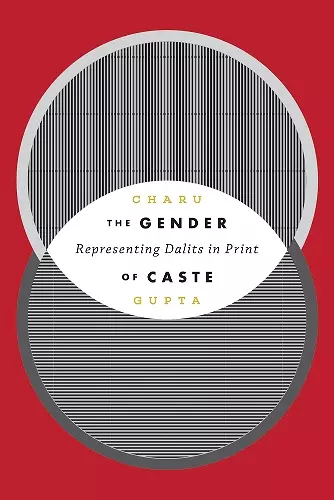The Gender of Caste
Representing Dalits in Print
Charu Gupta author Anand A Yang editor K Sivaramakrishnan editor Padma Kaimal editor
Format:Hardback
Publisher:University of Washington Press
Published:1st Apr '16
Currently unavailable, and unfortunately no date known when it will be back
This hardback is available in another edition too:
- Paperback£34.95(9780295744223)

The first book that brings together non-Dalit and Dalit discourse and print literature to explore representations of Dalits: their bodies, labor, and cultural and religious practices in Hindi discourses. The Gender of Caste takes on an important topic and contributes a wealth of material and analysis. -- Francesca Orsini, author of The Hindi Public Sphere, 1920-1940: Language and Literature in the Age of Nationalism An important contribution to the scholarship on caste struggles by one of our key historians of gender history. By bringing an historical perspective to the study of Dalit women's lives, the book alters the overwhelmingly male focus of existing works on caste reform and Dalit politics. -- Anupama Rao, author of The Caste Question: Dalits and Politics in Modern India The Gender of Caste is a tremendous scholarly achievement that freshly illuminates a nuanced narrative about gender and caste as forms of social practice and associative ideologies that serve to constitute one another. Gupta ably moves among the fields of history, literature, visual culture, folk culture, and religion to tell this story with remarkable clarity and depth. -- Laura Brueck, author of Writing Resistance: The Rhetorical Imagination of Hindi Dalit Literature Once again, Gupta has crafted a meticulous and groundbreaking contribution to the social and cultural history of the Hindi-medium public sphere. Through insightful analysis of a remarkable range of early print sources, including words and images, she chronicles both the changing depiction of Dalits and especially of Dalit women-as vamps and victims, as gullible converts and heroic martyrs-as well as Dalit responses and resistance to such representations. The result is a fine-grained study of 'othering' that sheds new light on the multiple selves that it seeks to define and defend. -- Philip Lutgendorf, author of Hanuman's Tale: The Messages of a Divine Monkey
Caste and gender are complex markers of difference that have traditionally been addressed in isolation from each other, with a presumptive maleness present in most studies of Dalits (“untouchables”) and a presumptive upper-casteness in many feminist studies. In this study of the representations of Dalits in the print culture of colonial north India, Charu Gupta enters new territory by looking at images of Dalit women as both victims and vamps, the construction of Dalit masculinities, religious conversion as an alternative to entrapment in the Hindu caste system, and the plight of indentured labor.
The Gender of Caste uses print as a critical tool to examine the depictions of Dalits by colonizers, nationalists, reformers, and Dalits themselves and shows how differentials of gender were critical in structuring patterns of domination and subordination.
"The significant impact of this book is that it has not only sharpened gender sensitivity but also heightened awareness of the immensely complex challenges of diversity management in India as a whole. . . . It will be a reference point for much future research."
-- Vineeth Mathoor * South Asia Research *"Gupta adds to overall Dalit and global feminist scholarship a rich and dense analysis of texts and contexts to unpack the 'biopolitics of caste.' It is an engaging example of interdisciplinary work focused on close readings of print and popular culture representations from colonial India, including present-day representations, that construct, contest, revise, and influence narratives of gender and caste."
-- Veena Deo * Journal of Asian Studies *"Charu Gupta has made her contribution in the field of historical research at the intersection of gender and caste in India widely acclaimed. . . .This book serves as a timely reminder for gender scholars working on colonial India that gendering is experienced by all bodies, and hence the time has come to question the central subjectivity of women in most works."
-- Arpita Chakraborty * Religion and GendISBN: 9780295995649
Dimensions: unknown
Weight: 635g
352 pages